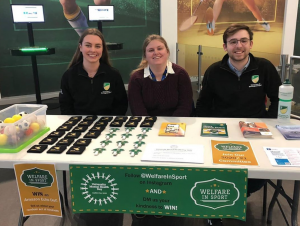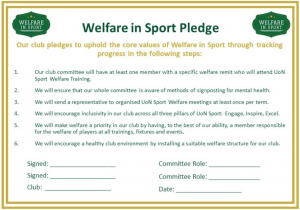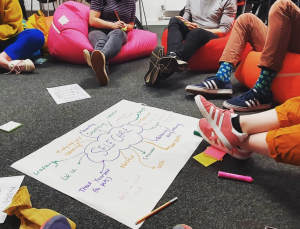
September 14, 2020, by Issy
Welfare in Sport
I’m Issy and I’m a 4th year medical student at Nottingham – I felt the need for a reintroduction, seeing as I’ve been writing on this blog for two years now! One of my very first blogs was about sport and mental health – its always been a passion of mine: now I am involved in the Welfare in Sport campaign. It means a lot to me, and I thought I would dedicate this blog post to it.
Why does it mean so much to me?
I started at Nottingham back in 2017 with a lot of experience in sport (namely rowing and sailing) but also a lot of anxiety around taking part and being ‘good enough’ to be part of a uni sport club. I knew I wanted to do sport still though, as it had always been a lifeline for me through school, as a coping mechanism for poor mental health, but the fear of a new place, new people and that constant ‘am I good enough?’ set up a major barrier for me. Eventually I gave up trying to fight the fear, and sure enough, found my mental health got pretty bad towards the end of my first year: I had gone from training 2 hours a day, 5 days a week, to barely managing an hour a week
So, in my second year I was introduced to Hannah Webber (our inclusive sports officer), and the inclusive sports programme, and it changed my university life and experience for the better. By this time, I had joined the university sailing club (encouraged to by a course friend, who did it, so I knew I would know someone) and became the welfare officer on the sailing committee. I then got involved with Welfare in Sport as their social media officer.
Who are we?
What Welfare in Sport does is simple and important: raises awareness about the importance of sport for maintaining positive mental health, and also encourages the 70+ UoN sport clubs to support their members in terms of their wellbeing and mental health. My job as social media officer was to use social media to spread the word and ethos of the campaign – our Instagram account @welfareinsport has increased 6 fold in followers since October 2019 and Welfare in Sport has become very well known amongst all university sport committees, and the message is now starting to spread to other non-sport societies, which is really heartening to see. Every UoN sport club is asked to sign a ‘pledge’ which details how they will support their members, with some pre filled aims and also space for 3 more to be added.
I became so invested in the campaign and the highly personal relation I could forge with it, that this year I am the chair of the campaign, overseeing a small but dedicated committee of 12 students from a variety of different sports, all keen to spread the same message, that mental health can be just as important as physical health in being a good sportsplayer. Im now in my 4th year, fallen back in love with sport and all the good things it brings, and feel I have a real purpose in life again, as sport was always such a big part of my life.
What’s the philosophy behind it all? What’s the point of sport as I see it?
The fact UoN Sport has so many different aspects of its inclusivity programme: from student run campaigns such as Welfare in Sport, to full year-round dedicated programmes such as Engage, demonstrates to us students with additional requirements that we are just as important to the sports department as those top level athletes. Clearly the sports department cares for all of its members, and wants to allow everyone to achieve to the best of their potential: from opportunities to get involved in the sports themselves, to spreading the word through campaigns like Welfare in Sport, and others like Men’s Health Active (encouraging men to talk about mental health using the common ground platform of sport as a foundation, and get involved) and Empower (encouraging female participation in sport).
For me, sport is more than just ‘a healthy lifestyle’. I learnt first hand what can happen if sport is removed from my routine: I honestly rely on it to stay on top of my game (pun entirely intended), and give myself some validation for standing up for what I believe in: that sport should be accessible for all, no matter what level, physical ability, or the emotional state you are in – it really is a life changer.
Follow what we get up to this year:
Instagram @welfareinsport
Facebook ‘UoN Welfare in Sport’
Twitter @welfareinsport
UoN Sport links:
UoN Disability Sport Officer: Hannah Webber – hannah.webber@nottingham.ac.uk
No comments yet, fill out a comment to be the first




Leave a Reply